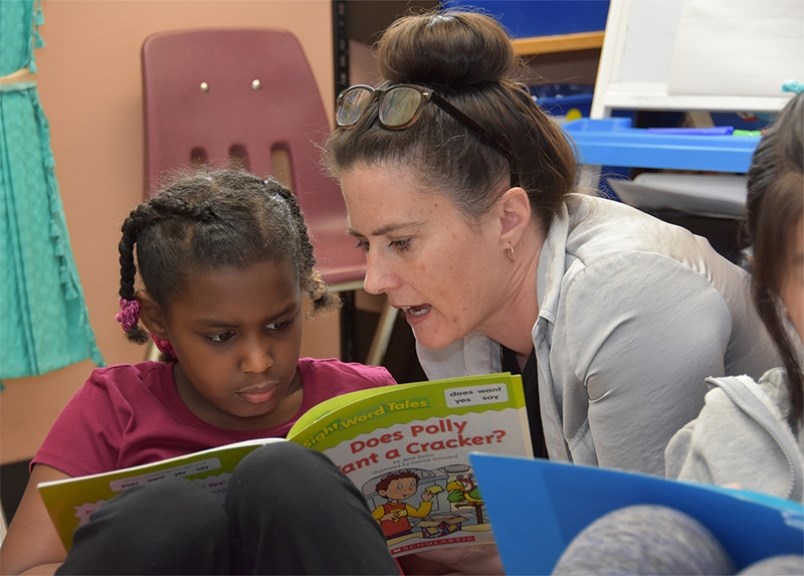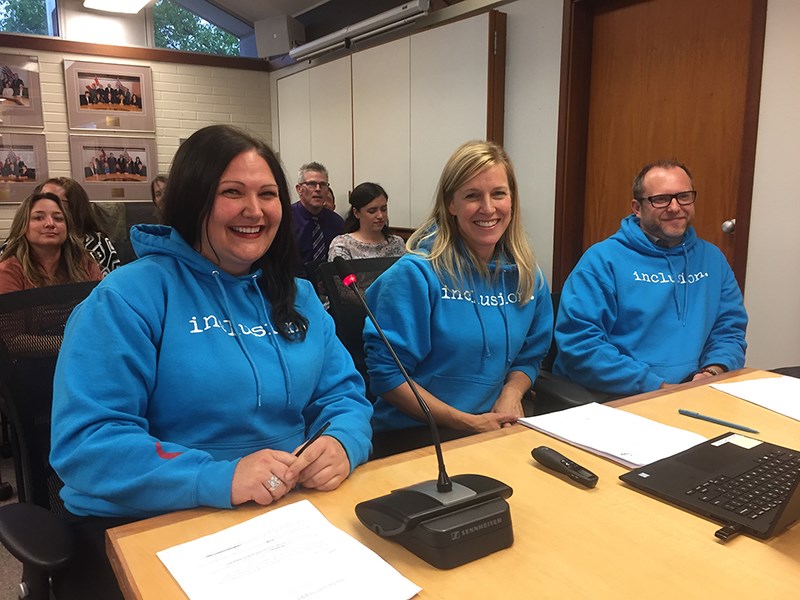A team of youth workers and teachers is reaching out to families whose youngsters don’t attend school and, in future, intend to develop more programs for at-risk kids.
May 14, members of School District 43’s Inclusion Support Team described a successful pilot program at Central elementary school in Port Coquitlam, where students who miss school 20 days or more are given special supports.
Youth workers call home and offer to pick up non-attenders, and when the children get to school, they are given breakfast.
Steph Murphy and Shawn O’Brien said the pilot was successful, with attendance and arrival times improving by 65%.
The initiative is one of a number underway to provide extra supports to students with behavioural issues, autism spectrum disorder, physical and mental health concerns, and those who are not diagnosed but have specific learning needs.
“These strategies are good for all kids but are essential for some kids because they need them to be successful,” said Paul McNaughton, the district's director of learning services.
For the last several years, SD43 has been shutting down segregated programs for students with special needs and is now supporting them in the classroom.
Most of the work has been done at the elementary school level, including helping children with complex needs get ready for kindergarten, but the recent closure of the Tower program at Citadel middle school has resulted in more focus at the middle school level.
Currently, the team of 11 teachers, 10 education assistants and three youth workers handles more than 500 referrals a year, 97 for children not diagnosed or whose diagnosis is pending, 371 at the elementary school level, 123 at the middle school level and 29 at secondary school.
The district is also dealing with a change in the types of student needs. In the last three years, for example, SD43 has enrolled 20% more students with a physical disability and chronic health impairments, and 31% more students with autism spectrum disorder while the number of students with intensive behaviour needs or serious mental illness has dropped by about 11%, according to SD43 figures.
McNaughton said the district is moving from a reactive to a proactive model as part of an effort to be more inclusive. In addition to programs, the team will go out to schools to address special concerns.

They end up working with school administrators and teachers on strategies for specific students, modelling or teaching educators and principals strategies that will help children.
Indeed, the term now used to talk about inclusion in the classroom is “the school-owned child,” which means students with special needs are part of the regular classroom, not exiled to a special program where they stay for their entire school career.
“It’s not sending them somewhere else,” McNaughton said. "They are actually getting their needs met in the classroom."
Still, there are challenges.
At a recent board of education meeting, Coquitlam Teachers' Association president Ken Christensen called for more supports for teachers who deal with children with behavioural issues.
This week he reiterated those concerns in an email.
“The Inclusion Support Team is run off their feet and could use more staff. They are the first port of call outside a school building for behavioural issues.”
He advocated for more supports to help teachers who are dealing with students with behavioural issues “as it would reduce significantly higher costs in replacement workers, time loss and WorkSafe premiums, as there is a high volume of teachers reporting dealing with violence and aggression in classrooms at younger and younger grades.”
McNaughton said there is always room for improvement but said the team has grown in numbers, doubling the number of staff in the last four years, and the team has become more efficient since a group supporting autism and another focused on behaviour issues were amalgamated.
A number of new supports for at-risk children are also on the horizon.

Future initiatives include an outdoor engagement pilot for at-risk youth and an adaptive soccer program for James Park and Central students, to be developed in collaboration with Kinsight with the support of MoreSports and Coquitlam Metro Ford Soccer Club.
Another program, called Stop Now and Plan, or SNAP, helps children in grades 2 to 6 with behavioural issues develop skills for problem-solving and emotional regulation.
Boys and their families are invited for 11 sessions of 90 minutes each at Winslow Centre and Como Lake middle school. The boys work on developing skills through dialogue, role playing and scenarios while their parents learn strategies to support their sons in the home and the community.
No longer are these youngsters put into classrooms away from their peers. Today’s new strategies encourage them to be successful in their home school, McNaughton said..
“We’re taking about supports that are good for all kids,” McNaughton said.



